Across from City Hall, a protest encampment is a ‘reminder’ of need for police reform
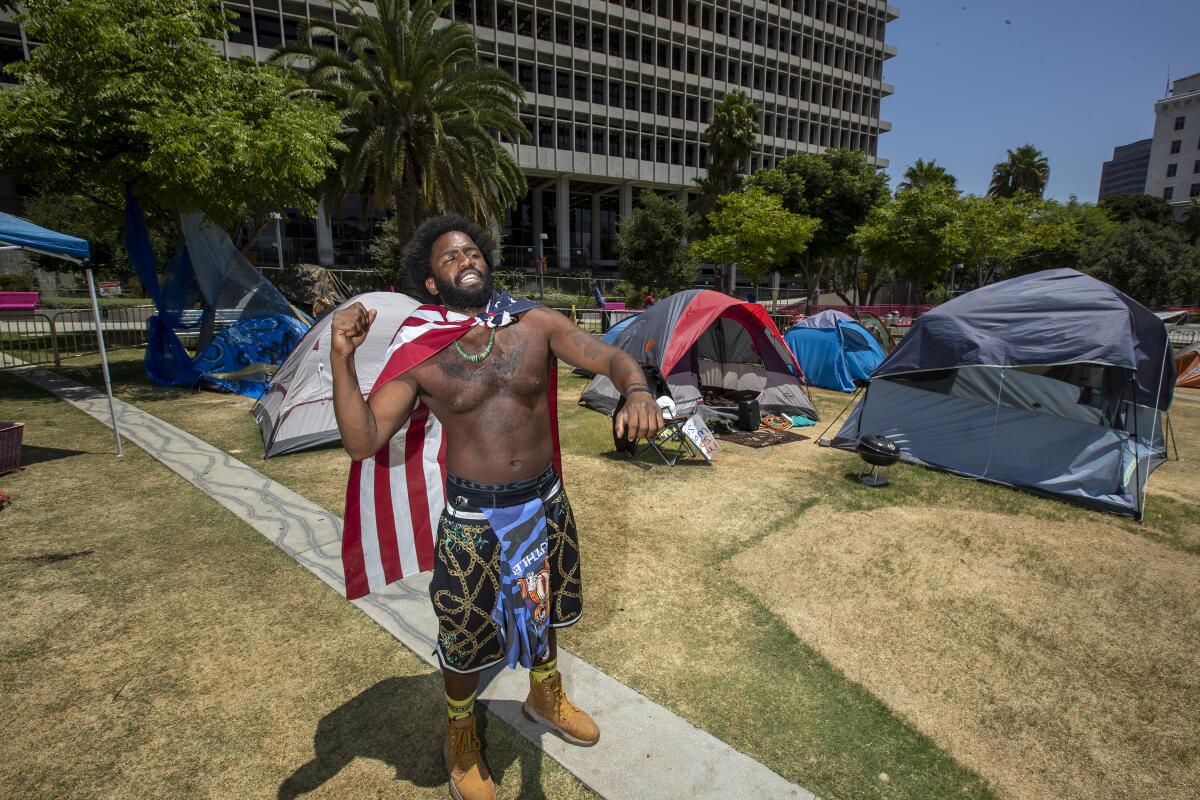
- Share via
James Butler was tired of watching protests against racial injustice end abruptly each night as Los Angeles police ordered demonstrators to go home.
The 22-year-old founder of Black Future Project, one of many new activist groups that sprang up in the city amid waves of demonstrations following the death of George Floyd, was among thousands of marchers who took to the streets earlier this summer calling for wholesale change to a criminal justice system he feels routinely brutalizes Black and brown people.
But as city and county officials ramped up efforts to slow protests that had at times been marked by violence and vandalism, calling in the National Guard and instituting curfews, Butler began to grow frustrated.
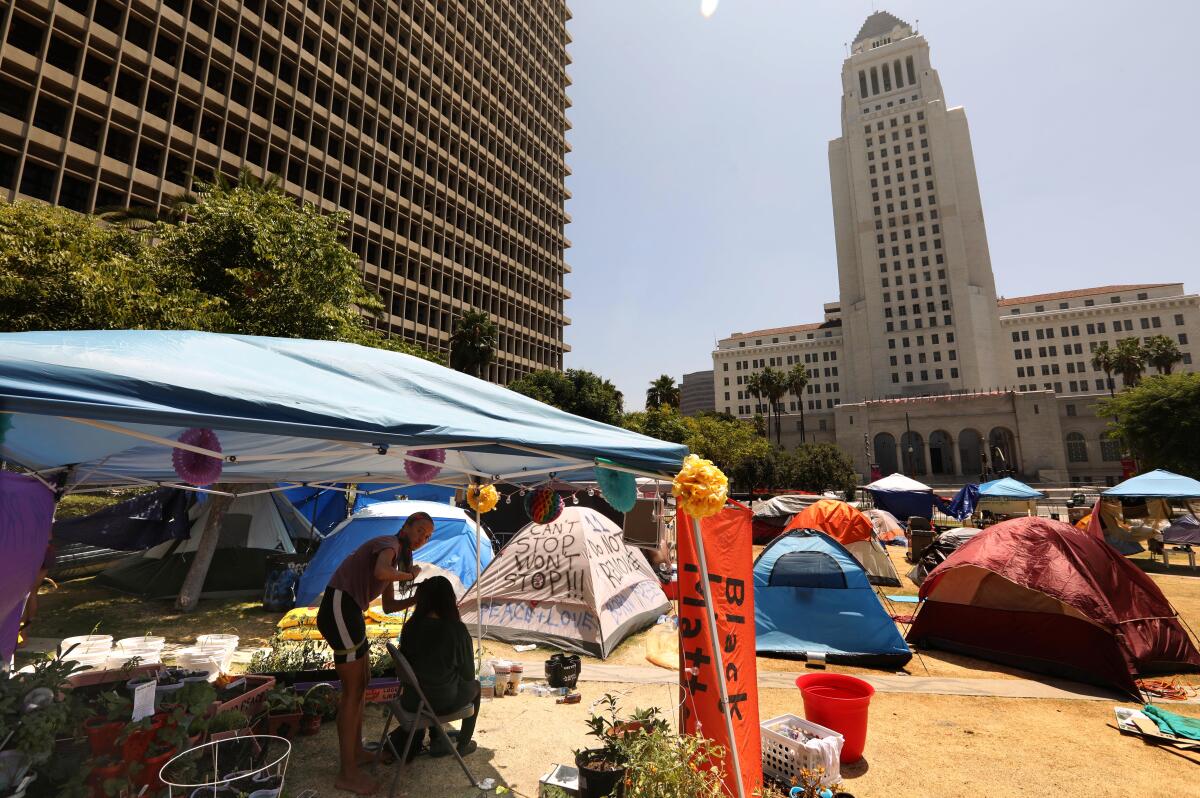
“You can’t say ‘defund the police’ and then be going home when they tell you to go home,” he said.
Instead, Butler and a few other demonstrators decided to make their home the protest. On June 9, they erected a camp in Grand Park. Two months later, it has grown into both an outdoor activist community and a visible reminder to anyone walking through downtown L.A. that even if protest crowds have shrunk since early summer, the push for change is far from over.
“You gotta catch the bus, you come out to Civic Center, no matter what you do, you will see this, and you’ll think, why are they there? Why are they still there?” said Ben Jenkins, 29, who cooks most of the meals at the camp.
Butler’s group parted ways in early July, and the camp is now under the banner of another new organization, Black Unity L.A.
Protest occupations have launched in several U.S. cities this summer, aimed at reclaiming public spaces as demonstrations of how communities without police might work.
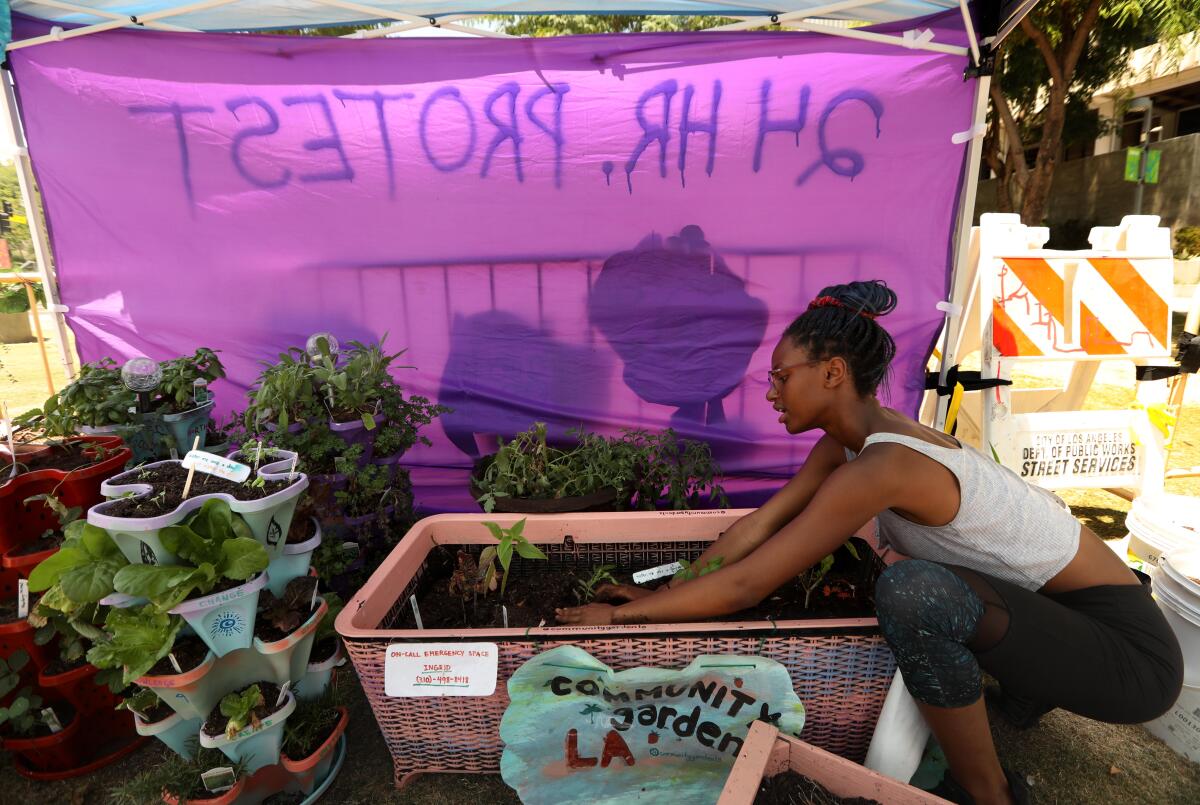
Results have been mixed. Seattle’s Capitol Hill Autonomous Zone, which spanned several blocks, was cleared out in early July after three weeks following a pair of shootings that left two young Black men dead. Last month, a protest encampment that had sprung up across from New York City Hall in Manhattan was shut down after its initial organizers began to cede ground to homeless people, as graffiti and vandalism in the area drew the ire of residents and police unions.
The Los Angeles encampment — which sits near City Hall, LAPD headquarters and the county’s largest courthouse — has drawn few objections by comparison, as the COVID-19 pandemic has drastically reduced downtown foot traffic.
Jenkins says about 30 people are directly involved with the community now; nearly half of them spend their nights sleeping downtown in a sprawl of tents that sit behind a circle of small barricades directly across from City Hall. Beyond the tents, the demonstrators have set up a kitchen where Jenkins fixes as many quick meals as he can from whatever food the group can scrounge. Donations have stocked a library with a range of books, from Stephen King bestsellers to tomes on art history.
A garden sits toward the back of the area, with herbs and vegetables ready to sprout in planters marked by the names of Black men and women killed by police across the country, including Floyd and Breonna Taylor. At the edge of the garden, a hut made almost entirely of fallen palm fronds is a nod to the Indigenous Tongva people who once called Los Angeles home.
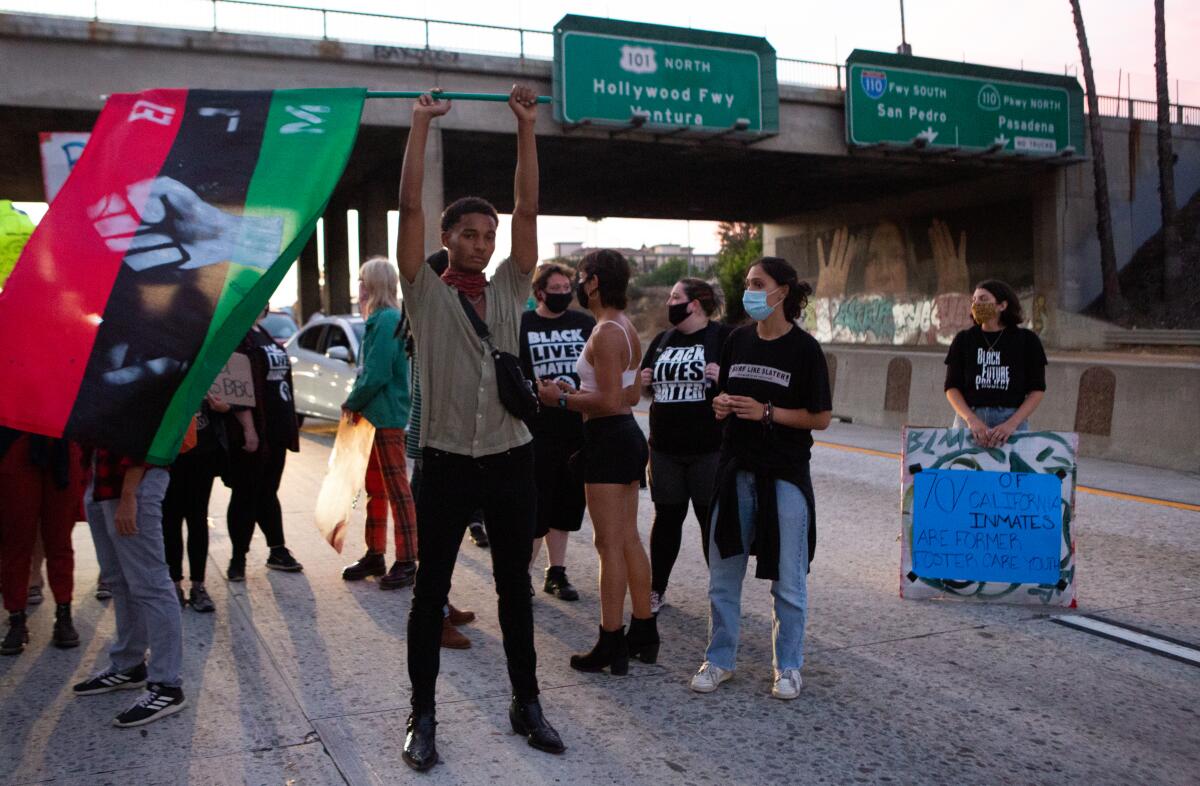
One hot July afternoon, 32-year-old R.J. Dawson could be seen walking around with a bucket of oranges, offering the fruit to both his fellow protesters and the homeless people living on the edges of their encampment, whom many refer to simply as “neighbors.”
“I do see this as a community, an example of the societal reform we hope to see,” said Dawson, nodding toward the tents beyond their gates. “We’ve put ourselves in the community, and now we need to contribute.”
Videos posted to Black Unity’s Instagram page have shown members handing out food on skid row. Jenkins says that when the group receives donations of perishable items, especially meat, he tries to cook all of it quickly and delivers leftover meals to the homeless people living in other parts of the park.
The group’s demands include an end to the practice of qualified immunity, which shields police officers from civil liability for some of their actions; eliminating the L.A. Unified School District’s campus police; increasing de-escalation training for law enforcement; and opening all police discipline records to the public.
Jenkins says those staying in Grand Park understand that they could be evicted at any time and have tried to minimize confrontation. There’s little garbage around the site, and aside from the appearance in early July of graffiti critical of Los Angeles County Dist. Atty. Jackie Lacey, City Hall has remained largely unblemished.
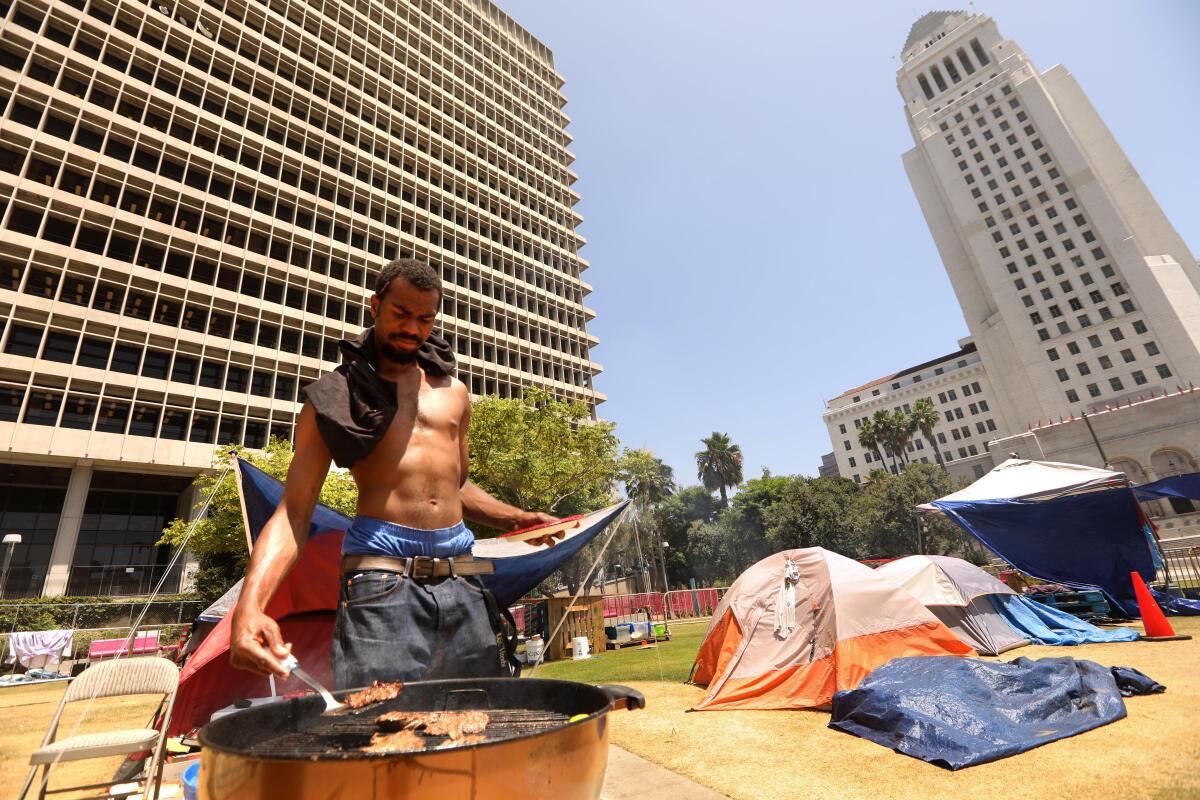
“It’s not worth it. It’s unnecessary, and it would make us look bad,” Jenkins said. “I know they’re just waiting for any excuse to come over and try and forcibly remove us, so we’re not going to give them an excuse.”
The group had not faced an explicit threat until Aug. 5, when signs appeared warning that people who stayed in the park after 10 p.m. could be arrested or fined. Bonnie Goodman, spokeswoman for Grand Park, said park staff posted the signs at the request of the Los Angeles County Sheriff’s Department, which is responsible for patrolling the area, “to reinforce the county’s established rules and regulations for the park.”
Capt. Britta Steinbrenner of the sheriff’s County Services Bureau said the agency was “monitoring” the group and had no plans to evict them.
“They’ve been allowed to protest as long as they’re peaceful,” she said.
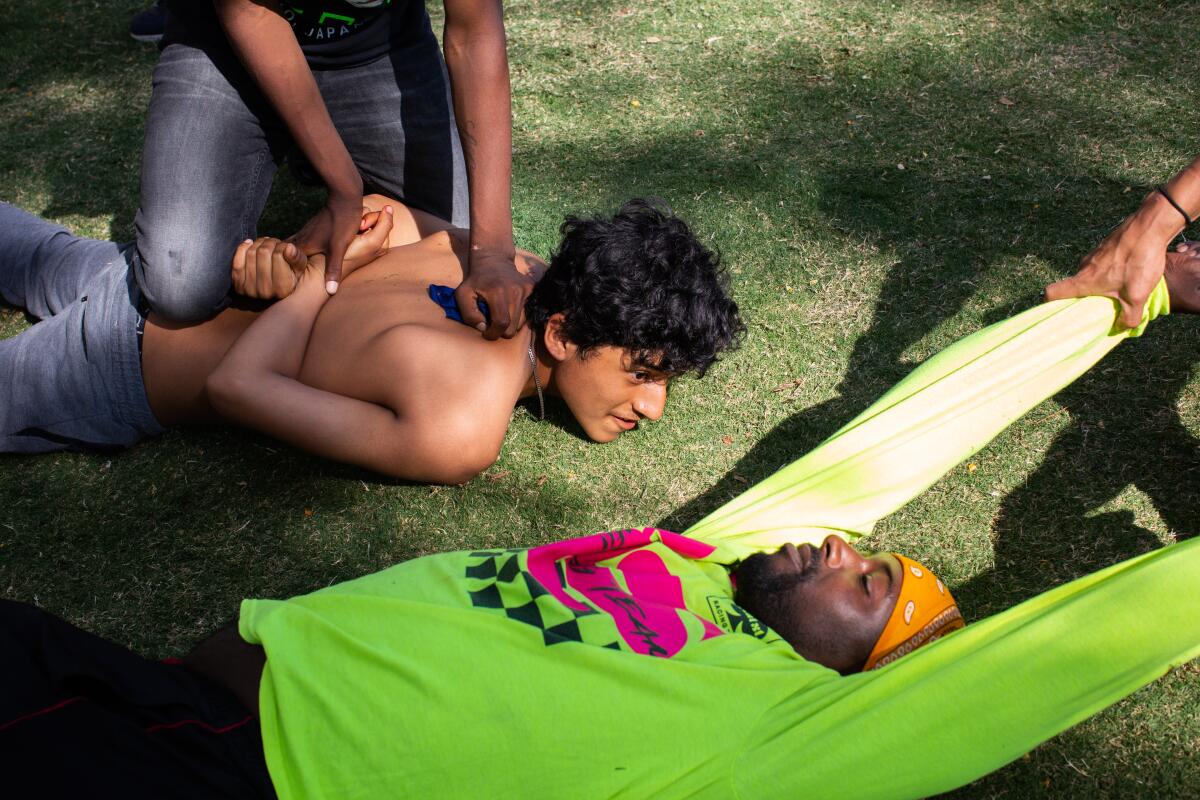
The signs, though, drew nearly 100 protesters, who arrived that night to chant and fortify the barricades around the area with wooden pallets as they steeled themselves for the arrival of law enforcement that never came.
Some local leaders have begun to complain. Patricia Berman, president of the Downtown L.A. Neighborhood Council, released a video Aug. 8 expressing concern about “deteriorating conditions” near the encampment and warned residents to avoid the area.
Berman referenced a recent sexual assault in the park, though police officials have said it is not clear if the reported attack is connected to the encampment. Capt. T. Scott Harrelson, who heads the LAPD’s Central Division, said his officers generally had not “had many issues with anybody that’s camping in there.”
Some staying at the camp joined a counter-protest last month to a rally on Spring Street in support of the LAPD. Jason Morales, a 34-year-old Angeleno who was out walking with an American flag tied around his shoulders as a cape, said he considered it a “victory” that he was able to engage in a debate with an LAPD officer that day without a clash.
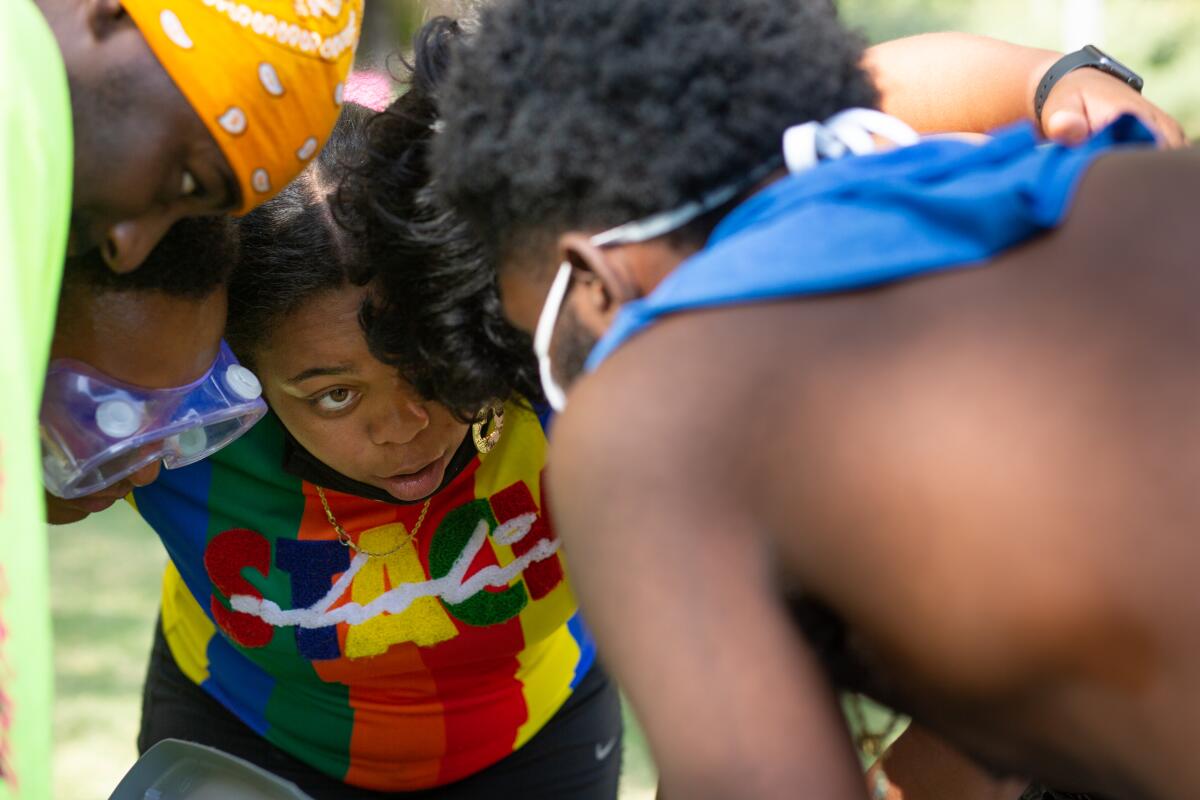
Morales said he learned about de-escalation tactics while inside the camp and had used those skills to help mitigate disputes among occupants.
“There’s been things that have happened at the park, obviously, but we’re not going to call the police for help,” said Butler. “We’d rather deal with it internally.”
Butler said he intended to combine education and activism when founding the camp. In mid-June, the group held a viewing of Ava DuVernay’s documentary “13th,” which focuses on the disproportionate incarceration of Black people in the U.S. Black Future Project had previously used the site as a staging ground for protests, and more recent events under Black Unity have focused on teaching people how to render first aid during protests.
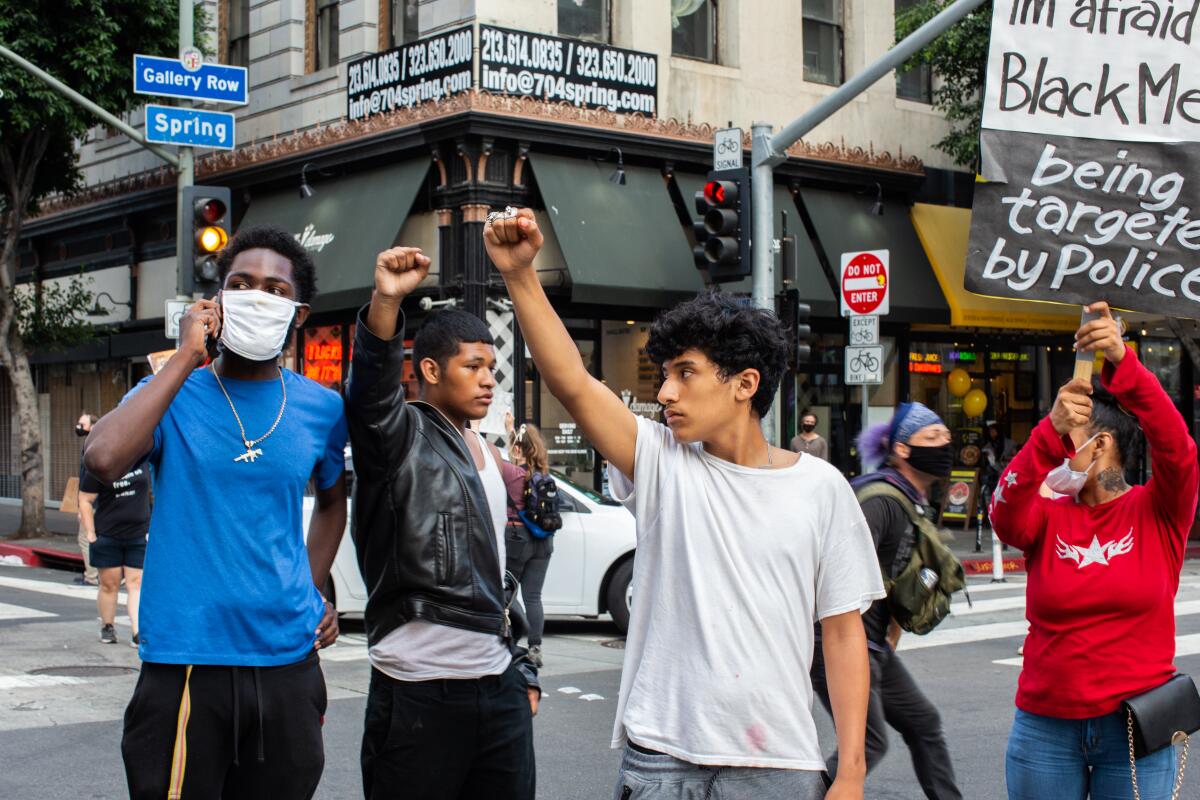
For all the talk of community, though, apparent ideological differences split the two activist groups. Members of Black Future Project claimed a violent clash led them to leave the park July 9. The current occupiers said the breakup was driven by a dispute over how to run the camp.
Jenkins said continued acts of police violence had proved the need for the site. Nine days after the encampment was founded, he noted, a sheriff’s deputy in Gardena fatally shot 18-year-old Andres Guardado in the back five times. Sheriff’s officials said Guardado was armed with a weapon and that they were investigating, but the incident has spurred ongoing protests and calls to prosecute the deputy who opened fire.
“Our main focus is to stay here, planted, and be a constant reminder,” Jenkins said. “Injustice is here, and nothing’s been done about it.”
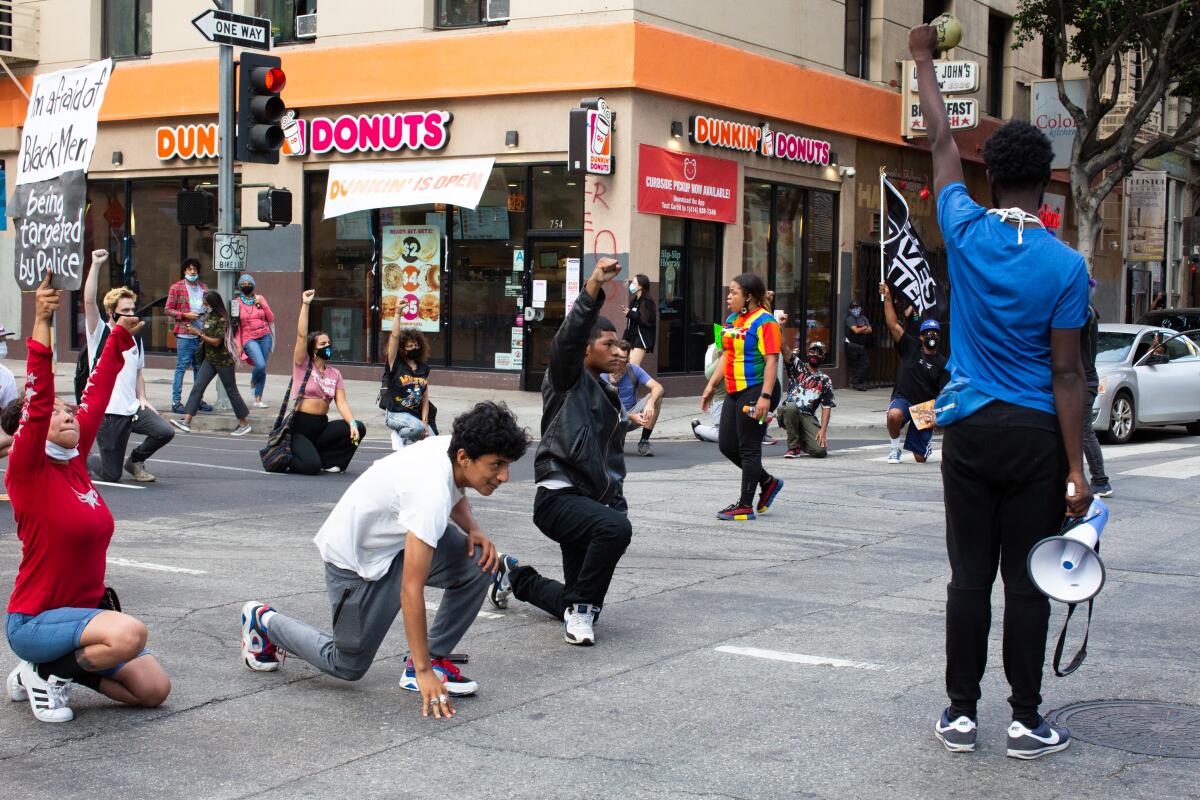
More to Read
Sign up for Essential California
The most important California stories and recommendations in your inbox every morning.
You may occasionally receive promotional content from the Los Angeles Times.














